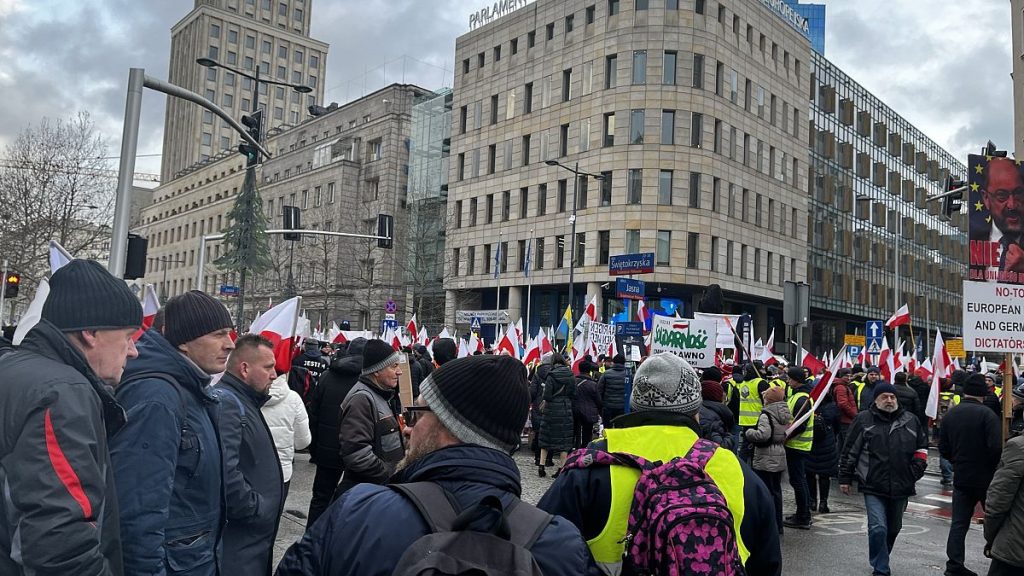The Polish countryside roared its discontent on the eve of a celebratory moment for the nation. As Poland prepared to assume the Presidency of the Council of the European Union, a symbolic passing of the torch within the bloc, farmers converged on the capital city of Warsaw, their tractors and banners forming a stark counterpoint to the gala festivities. Their protest, centered around the slogan “5 x STOP,” highlighted five key areas where they believed EU policies were adversely impacting Polish agriculture: the Mercosur trade deal, the European Green Deal, the influx of Ukrainian agricultural products, the perceived destruction of Polish forestry and fishing sectors, and broader economic challenges within Poland. This demonstration served as a potent reminder of the growing tensions between the aspirations of European integration and the anxieties of those whose livelihoods are directly affected by its policies.
The farmers’ protest in Warsaw was not an isolated incident. It formed part of a larger wave of agrarian unrest that has been sweeping across Europe since December 2023. From the rolling fields of France to the sun-drenched plains of Spain, farmers have voiced their growing opposition to policies perceived as detrimental to their interests. The Mercosur trade agreement, a proposed pact between the EU and several South American countries, has become a particular flashpoint. European farmers fear that the deal will flood the market with cheaper agricultural products produced under less stringent environmental and labor regulations, undermining their competitiveness and threatening their livelihoods. This shared concern has fostered a sense of solidarity among farmers across national borders, unifying them in their resistance to the perceived threats to their way of life.
The Polish government, echoing the concerns of its French and German counterparts, has officially expressed its opposition to the Mercosur deal, aligning itself with the anxieties of its agricultural sector. The influx of agricultural products from Ukraine has further fueled the discontent among Polish farmers, who argue that it places them at a competitive disadvantage. They contend that Ukrainian producers benefit from lower production costs and less stringent regulations, making it difficult for Polish farmers to compete in the domestic market. This concern underscores the complex interplay of geopolitical factors and economic realities within the EU, highlighting the challenges of balancing free trade principles with the need to protect domestic industries and livelihoods.
The farmers’ methods of protest have been both disruptive and symbolic. Road and highway blockades have become a common tactic, disrupting traffic flow and drawing attention to their grievances. Picketing in front of government buildings serves as a direct appeal to those in power, demanding recognition of their concerns. In November, Polish farmers staged a one-day blockade of a border crossing with Ukraine, a symbolic act aimed at highlighting the impact of Ukrainian imports on the Polish agricultural sector. Subsequent blockades on other roads throughout Poland further underscored their determination to make their voices heard.
The culmination of Friday’s protest in Warsaw was strategically chosen. The demonstrators marched towards the National Theatre, the very venue where the Polish presidency’s opening gala was scheduled to take place. This symbolic act served as a stark juxtaposition, contrasting the celebratory atmosphere of the gala with the harsh realities faced by the protesting farmers. Their presence served as a potent reminder that the success of the Polish presidency, and indeed the EU as a whole, hinges on addressing the concerns of its citizens, particularly those whose livelihoods are directly impacted by its policies.
The farmers’ protest in Warsaw encapsulates the broader challenges facing the European Union. Balancing the ideals of free trade and economic integration with the need to protect domestic industries and address the anxieties of its citizens remains a complex and ongoing task. The “5 x STOP” slogan serves as a rallying cry, not just for Polish farmers, but for those across Europe who feel marginalized by the forces of globalization and the perceived disconnect between policymaking and the realities on the ground. The protest, occurring on the eve of Poland’s presidency, underscores the need for a more inclusive and responsive approach to policymaking, one that takes into account the diverse needs and concerns of all its member states and their citizens.










